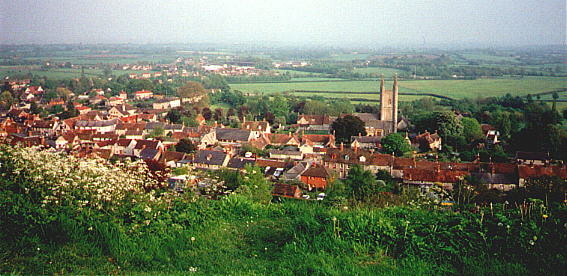 The image above is of the small town of Mere taken from Castle Hill. Mere is in Wiltshire. It lies at the extreme southwestern tip of Salisbury Plain close to the borders of Somerset and Dorset. Castle Hill, also called Mere Castle, is a medieval fortification built by Richard, the Earl of Cornwall, in 1253 on a hill overlooking the village of Mere.
The image above is of the small town of Mere taken from Castle Hill. Mere is in Wiltshire. It lies at the extreme southwestern tip of Salisbury Plain close to the borders of Somerset and Dorset. Castle Hill, also called Mere Castle, is a medieval fortification built by Richard, the Earl of Cornwall, in 1253 on a hill overlooking the village of Mere.
Saturday 21st October 1944, seventy years, one month and twenty eight days ago this small town saw the birth of a certain Marilyn “Mandy” Rice-Davies. Two days ago on Thursday 18th December, saw her death after a short battle with lung cancer.
Cancer is a very cruel instrument of the Grim Reaper and the British Gazette hopes that the late Mrs Ken Foreman had her passing eased as much as medical science could manage. That it was lung cancer that claimed the life of Mrs Foreman draws attention to the fact that it was London High Society of the London of the early 1960s – a time when most adults smoked and cigarettes were widely advertised on TV – that catapulted this beautiful young lady onto the centre stage cloaked in an aura of notoriety.
Unlike her onetime flatmate, Miss Christine Keeler, the then Miss Marilyn “Mandy” Rice-Davies had the strength and fortitude to capitalise on what became far more than 15 minutes of fame and from the lowest point of that notoriety (from a cell in Holloway Prison) Mrs Foreman in her own words described the remainder of her life as a slow descent into respectability.
In that, Mrs Foreman demonstrated a sharp wit born of a high native intelligence that complimented her beauty and enabled her to attain success and happiness in life. This was a lady who notwithstanding leaving school at fifteen became very well read. Of course, she is best remember for the now famous phrase “He would, wouldn’t he?”
This came about whilst she was giving evidence at the trial of Stephen Ward who had been falsely charged with living off the immoral earnings of Miss Keeler and Miss Rice-Davies, the latter made the now famous riposte. When James Burge, the defence counsel, pointed out that Lord Astor denied an affair or having even met her, she replied, “He would, wouldn’t he?” (often misquoted as “Well, he would, wouldn’t he?” or “Well he would say that, wouldn’t he?”). By 1979, this phrase had entered the third edition of the Oxford Dictionary of Quotations, and is occasionally abbreviated as MRDA (“Mandy Rice-Davies applies”).
At this point the British Gazette must dispel two misconceptions that are still believed by some:
1. Miss Christine Keeler and Miss Marilyn Rice-Davies were NOT prostitutes.
2. Miss Marilyn Rice-Davies was NOT a thief.
Miss Marilyn Rice-Davies was accused by the police of stealing a television set – in 1963 a very expensive piece of kit. The problem for the police was that the particular television that Miss Rice-Davies stole existed only in the imagination of a corrupt police officer!
Of course, not only did this prove the police were corrupt; it proved that they were also very stupid!
This was of course due to the fact that at that time (unlike the super slim lightweight TVs of today) TVs were very heavy, for not only did they have big heavy cathode ray tubes, they also had big heavy thermionic valves which required much electricity which in turn required even bigger and heavier transformers to power them.
Such a bulky and heavy item was not the sort of thing that a slim nineteen year old young lady would pick up and run off with!
The police committed the offences of Perverting the Course of Justice and Perjury to coerce Miss Rice-Davies into giving evidence against Mr Ward.
The police committed these serious criminal offences because they were directed to do so by their political masters in the government.
This of course will be no surprise to many British Gazette readers who know full well that serious criminality is a persistent feature of the British political establishment with senior politicians from all major parties regularly breaching their Privy Council Oaths (Perjury) and implementing EU Directives that cause HM the Queen to be in breach of her Coronation Oath to govern us according to Our Laws and Customs (High Treason).
The Editor recommends that readers read Mr Geoffrey Robertson QC’s excellent piece about the late Mrs Foreman in the Guardian.
Herewith: http://www.theguardian.com/politics/2014/dec/19/mandy-rice-davies-fabled-player-british-scandal-profumo
NB: the Editor has of course “borrowed” the title for the article from “The Sweet Lass of Richmond Hill”, the song written by Leonard McNally first publicly performed in 1789. The “lass” being Mrs McNally – formerly Frances I’Anson, who Leonard McNally married in 1787. Her family owned a property in Richmond in the North Riding of Yorkshire called “Hill House”, hence she was the “lass of Richmond Hill”. Mr I’Anson disapproved of McNally and the couple eloped. Mrs McNally died aged 29 in childbirth five years after getting married.
Speaking the Truth unto the Nation

That, is extremely interesting. Looking back at this case with what I now know of corruption in our seats of power, those two women were given a notoriety which they did not deserve.